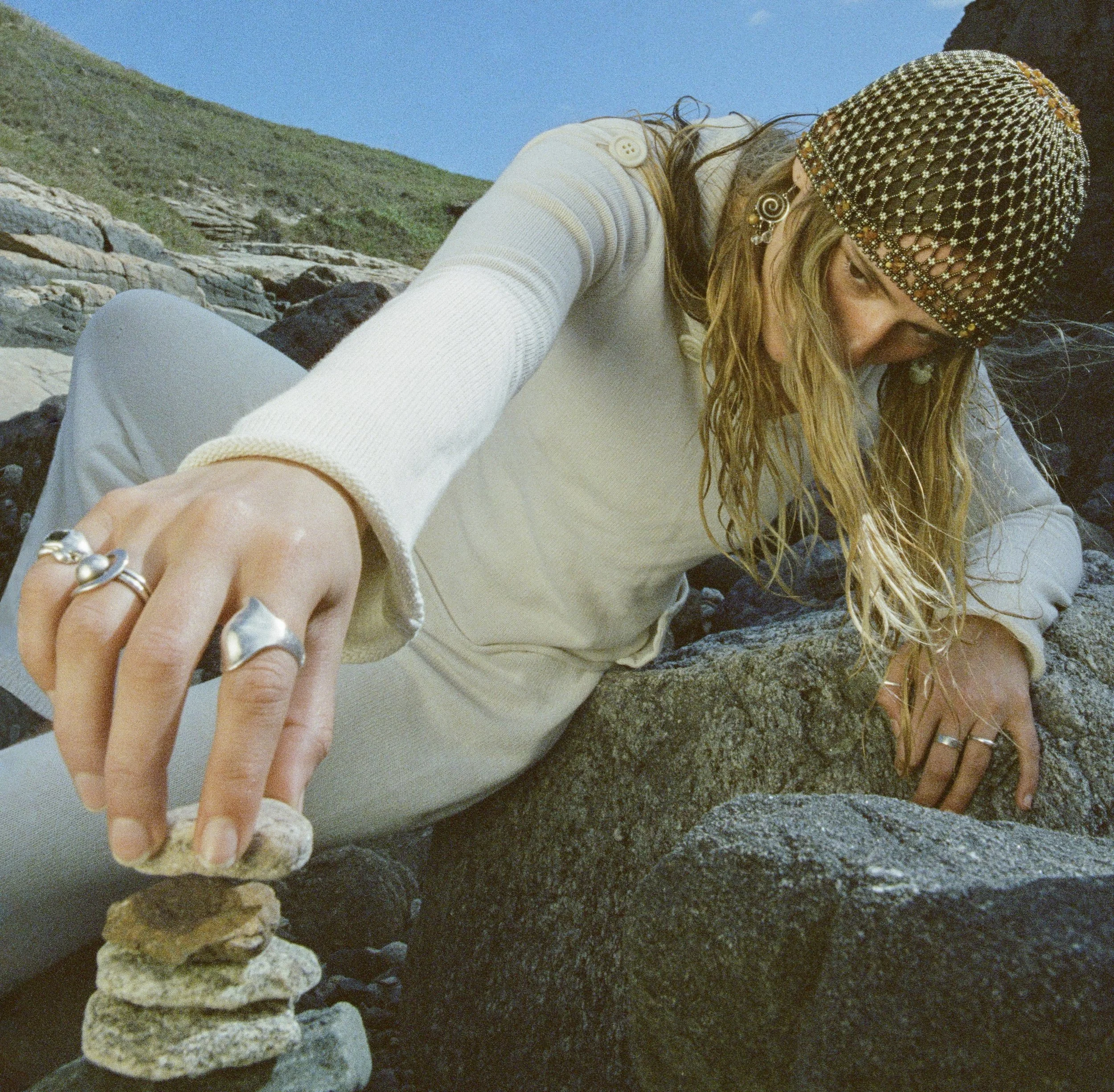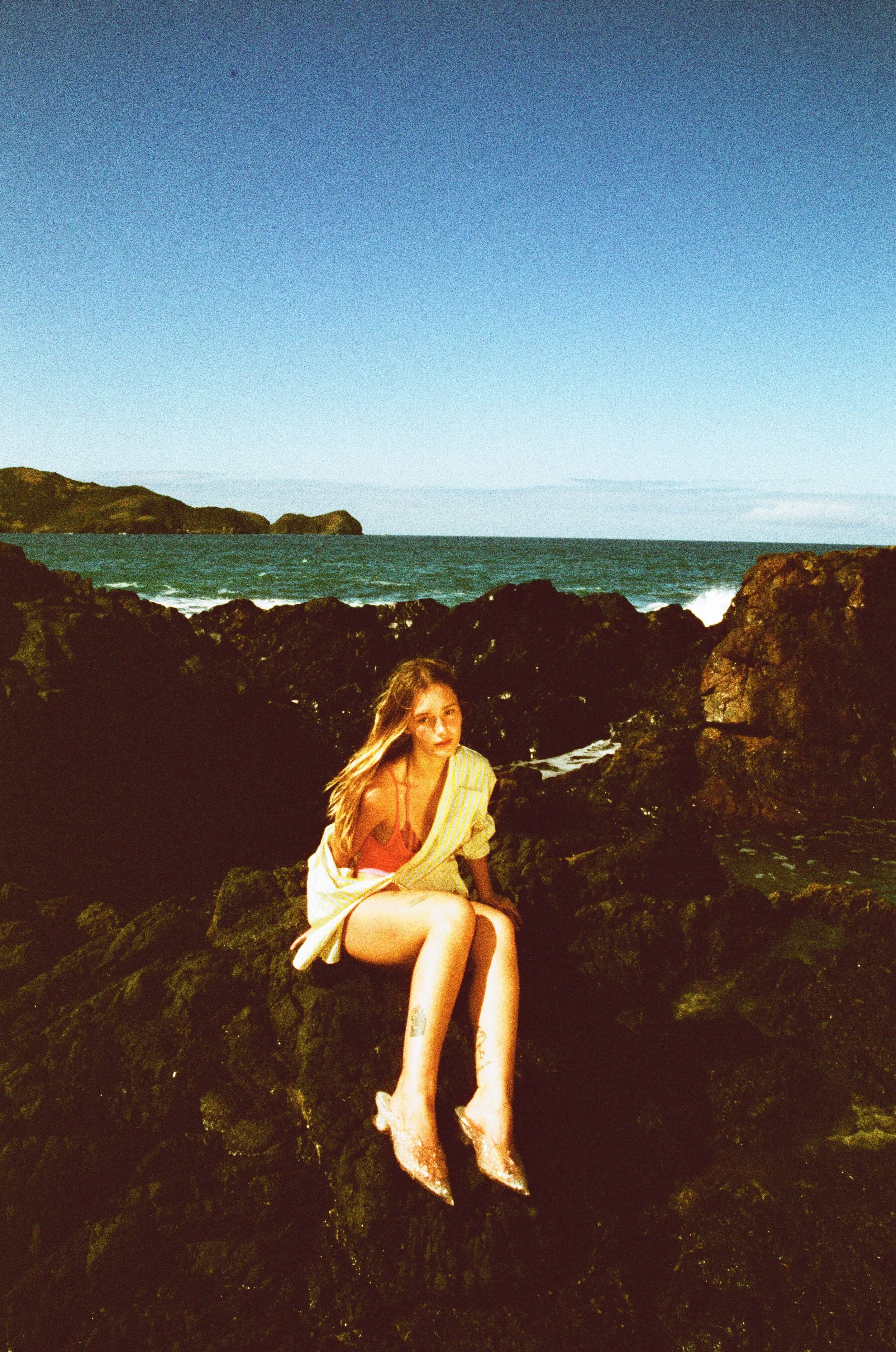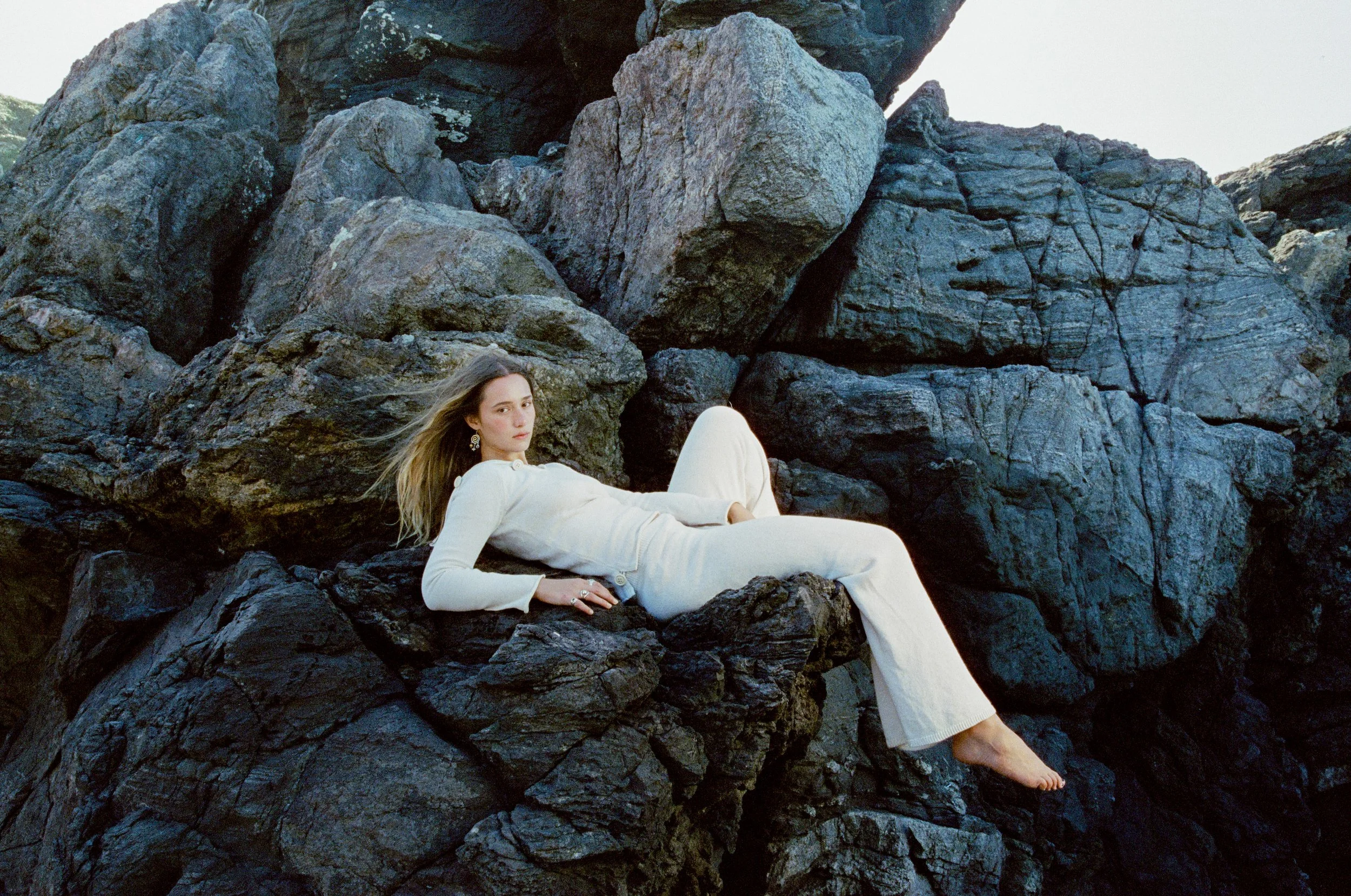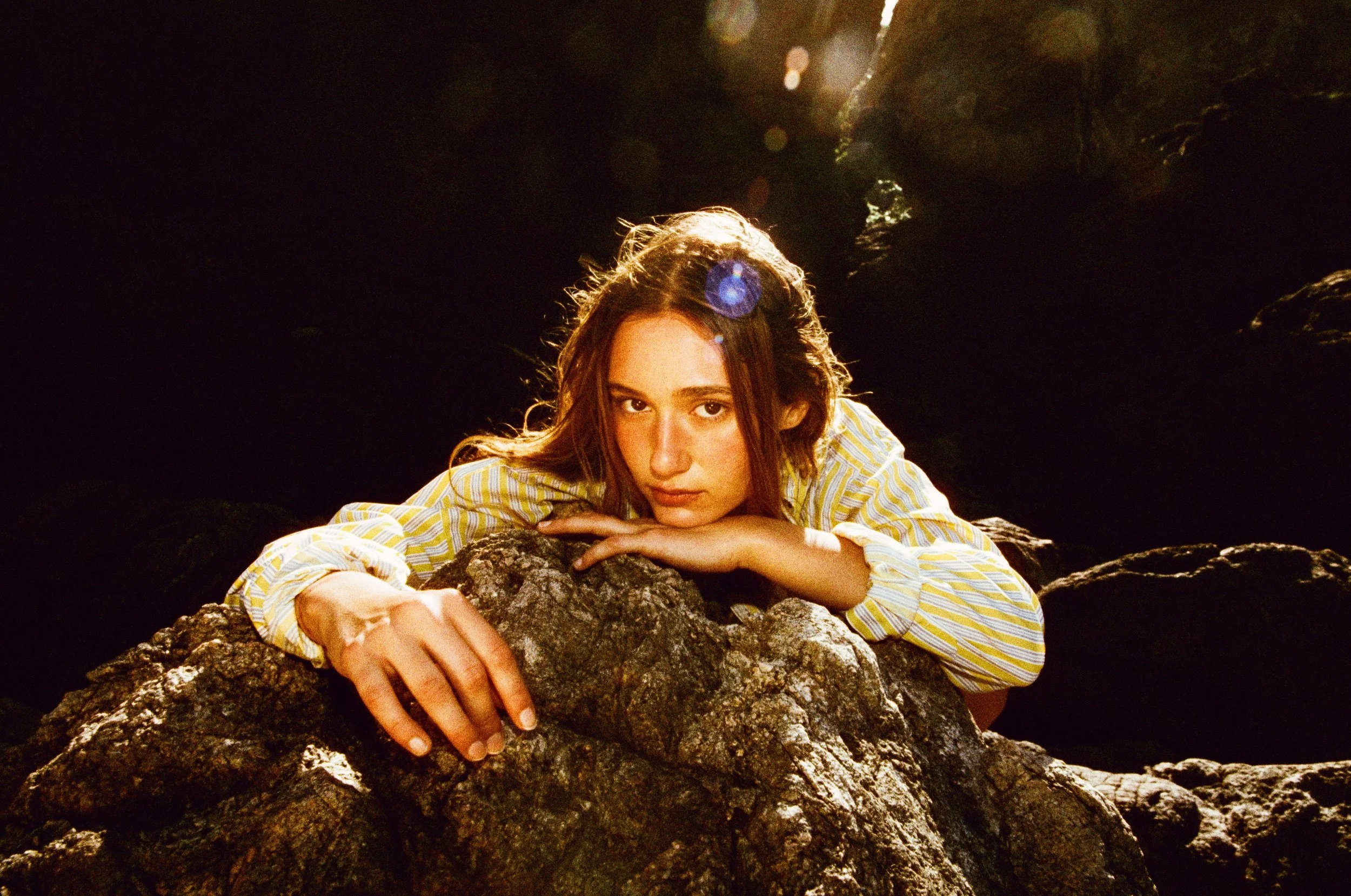Q&A: Gab Ferreira Creates A Singular Spiritual Path Through Genre-Blending Album ‘Carrossel’
INTERVIEW
INTERVIEW
☆ BY IVONA HOMICIANU ☆
GAB FERREIRA’S CARROSSEL IS A DUAL FEAT IN GROUNDING AND SPIRITUALITY. The Sao Paulo native has been making music for a decade, though her newest album, Carrossel, coming out October 10, shows immeasurable growth in her artistry. Ferreira’s latest single, “Law of Nature” serves as the opening track, which perfectly encapsulates the journey the album will take us on. Through grounding herself in the beauty of the world, there’s an accentuation of spiritual healing.
“Law of Nature” uses a calming production to fit in with the message of letting fate flow through you, instead of trying to change the circumstances that are meant for progress. Ferreira’s soft vocals, the synth focus on the chorus and the transition to string instrumentals at the end of the track all create a comforting atmosphere. The single is one of the two English tracks on the album, with the rest being in Ferreira’s native language, Portuguese.
“I felt like I reached this cool place where I was very comfortable and confident with the music that I was writing in English; and Portuguese was still this unknown zone, because when you change a language, it also has this specific thing of finding your own voice in that language.”
The 26-year-old Brazilian artist isn’t afraid of taking risks. Ferreira takes inspiration from several different genres – psychedelic rock, psych-pop, bossa nova and indie to name a few – to compose a body of work that falls in tune with the artist’s aspirations. The title track “Carrossel” sees a switch from “Law of Nature,” with strong electronic guitar beats and an urgency in vocals opposite to the opening track. Her emotional range becomes deeper with the soft ballad “Cuando eu Olho,” followed by a similar soft energy with “Ponta da Lingua” and “Meia Luz.”
“Mudanças” marks the middle of the album, returning to the dreamy sphere experienced during “Law of Nature” – the track feels as if floating in space, watching the past from above as acceptance takes over. The project takes a lighter turn, with the rest of the tracks translating written joy into a felt emotion. Each track leaves a mark on the listener, with the particular energies coming together to create an ambitious project. Ferreira shows her strength in taking inspiration from the beauty surrounding her and turning it into gold – whether that be her own memories, musical inspirations, or learned lessons.
Read below to dive deeper into Gab Ferreira’s Carrossel, out October 10.
Credit: Christina Coleman
LUNA: Could you talk about the inspiration behind “Law of Nature”?
FERREIRA: I think I was very inspired by this idea of just acceptance, in a way, acceptance of faith, surrendering. It's the meaning behind “Law of Nature.” I always liked that concept of something that you know is unchangeable, something that you know it is the way it is, and you have to work around it. I think it focuses on this idea of accepting your fate and surrendering to it has its own beauty, it has its own force.
LUNA: I love the sound, it's very fitting to the concept of letting things go and just pass through you. Did you know from the beginning how you wanted it to sound like, or was it more of a process?
FERREIRA: When I was starting to make this album, I had a lot of ideas of where it could go. For the first two or three months, I was making many songs a day, every day making ten to fifteen songs. And I remember that this one was a song that kind of happened. I think for every musician, this is always something that feels very magical. I remember we sat down and we started to make the beat, and then I started writing it down and really, I haven't changed a single word of it. I've been telling people that I feel like I heard it in a dream, it's the type of music that you feel maybe was in your head already before, like it came to life. It was definitely the first song that I've made that when I finished, I was like, Yeah, that's it for me, that's the atmosphere that I want to create for the album. And then from that moment on, I feel like all the songs were trying to not necessarily emulate the sound, but try my best to emulate that feeling. You know, the feeling that I felt “Law of Nature” sort of captured very naturally.
LUNA: The whole album itself sounds so dreamy. Towards the end of the song, you have the lyric “Let me hold you in my arms.” The first time I listened to it, iin the beginning I thought that it would be more about your own spiritual healing - but here it feels as if you're talking to someone, someone other than yourself, so I was wondering about that.
FERREIRA: This was the last part of the song. It was the last thing that I wrote separately. I pretty much wrote the entire song before, and then I wanted to finish with something that felt like an advice, that felt like a reminder for myself. I think the “Let me hold you in my arms” is really talking about more of that safe place. On this line, there is an ending that talks of “Take a leap of faith and dive into the arms.” For me, that metaphor of diving has always been something that I feel is very connected to life. I don't know you're on a rock, you know you're going to jump into an ocean, and you just have that inherent confidence that you're going to get there, that you're just going to sink and come back up and everything is going to be fine. I think in life, sometimes we need that. We need to be confident in those leaps of faith. That last verse is just really talking about finding that safeness into the unknown.
LUNA: Your album Carrossel comes out in October. Could you explain the title?
FERREIRA: Since I was a young girl, I was always very inspired by rocks and circles. And for a really long time, I was very obsessed with the idea of ouroboros, which is the snake that eats its own tail. I've always liked that, because I feel life always puts me into the same situations until I learn my lesson. At the beginning of it, I was just thinking of words and concepts that I could incorporate into this idea of something that is going round and round, and then randomly made the song “Carrossel.” I was just writing it and it felt right to use the imagery of a carousel, because it is this thing that's going round and round, but it has this kind of childishness to it. In amusement parks, it has lights, and I feel like I have a very dreamy connection with that imagery. After we wrote that song, it just felt right to have it as the title also because I'm really into the symmetry of the word, especially in Portuguese, because you write it C-A-R-R-O-S-S-E-L, so it's two R's, two S’ and I just thought that was cute.
LUNA: The sound of the album is so unique. Genuinely, I don't think I've heard anything like it, and that's really special.
FERREIRA: That’s so cool, thank you so much!
LUNA: I saw that you dedicated this album to those who are still enchanted by the beauty of everyday life. Which elements of beauty or nature have inspired you the most when you created it?
FERREIRA: I've always been very attached to memories, because I've always had this feeling that if I don't write every single thing down, if I'm not constantly keeping track of little things that happen, I'm super afraid that I'm gonna forget about them. I've definitely had many moments in my life already, about when I was a teenager, where I felt really sad that I was not being very serious about capturing these things. I think for me, a big part of being an artist has always been about really taking your life and the things that happen to you very seriously, because I feel this is how you create something that really represents you. And it's not necessarily just trying to follow something that you think is cool. I've always liked biographies, and I'm always like, Do it for the biography. Really capturing those moments of our lives and paying attention to them. I never want to be someone that is taking things for granted.
I think for me, experiencing the beauty in everyday life is really sometimes just looking around and leaving that passive mode in our heads, that mode that is just going to the grocery shop, buying a thing, going to work, for a mode of actively looking around and always trying to be perceptive of the things around you, and finding beauty where sometimes there's none. I’m living in a big city that sometimes can be ugly. I’m on this beautiful beach right now, and it's this type of beauty that is very easy sometimes to look at and be amazed - but I also want to walk around my city and see like, a crazy fucking building with this funny plant on the front, and also understand that has a beauty of its own.
LUNA: I'm also someone who likes to walk around and notice things and a lot of the time, like, I’m so overwhelmed with how big our world is. It's beautiful to have an album that puts these elements at the front, to take advantage of being alive.
FERREIRA: For sure. And also, I feel like we're taking things very seriously. My grandmother, my mother, they always give me this advice of, Gabi, thirty years from now, you're going to forget about this, and it's not going to be important anymore, and the things that are going to be that are going to be important, you're always going to recognize. And I think the more I grow old, the more I'm trying to do this exercise, the earliest I can, of having this hippie outlook on life, of really being able to stop every now and then, and recognize that things are good, that things are going to be fine, and not focus so much on these frustrating parts of life; the things that we are a little sad about.
Credit: Christina Coleman
LUNA: There's a lot of blending of genres in your album. Who were your musical influences growing up?
FERREIRA: My parents are not big music people, but they always had music on, and they loved music channels. I'm born in 1998 so I grew up listening to a lot of pop music from that era, 2000 to 2010, and I was very inspired by pop music, to be honest. Most of my childhood was a lot of Madonna, a lot of Britney, a lot of Black Eyed Peas. Then when I became a teenager, I started to fall in love more with bands and stuff, and psychedelic rock was something that I was really into when I was fifteen or sixteen, Tame Impala, Melody's Echo Chamber. I felt like I always loved that type of music, and definitely wanted to make an album like that someday in my life, but the time only came now. I fell in love with this kind of music again in the last year of making this album, a lot of Stereolab and also, like this kind of French and lounge music. There are a lot of inspirations, and I think each song has its own world. I'm also very inspired by artists like Caroline Polachek and Imogen Heap. I really like the way that they play with their voice, and it's something that inspired me a lot to create layers and with my voice trying to blend in with the instrumental, and kind of become a part of the song itself. But I'm always listening to a lot of stuff. I wake up every day and put on music and listen to a bunch of things.
LUNA: You can tell that you have a lot of different inspirations across the musical spectrum - and it really helps to make such a unique work.
FERREIRA: Yeah. There's always things that you can take inspiration from, and I feel like the more music I make, the more I want to make these things that are in a line of an undefinable genre. Even with my other projects, I think I'm really hyper focused on the concept, on an idea, and then trying to go the fullest to that place. I started to put out music ten years ago, and I definitely feel like it's been a developing process and a journey, and that I've already played with a lot of genres that I was really into.
LUNA: Ten years is a long time. Congratulations on that.
FERREIRA: Thanks! It feels like yesterday. I think I kind of realized this year that it was ten years and I was shocked, it really feels like it was yesterday.
LUNA: Your album is in Portuguese and English. Do you write in whichever language appears to you first when you have a song idea, or are you like, I should write this in English because it fits better in English, or I should write this in Portuguese because it sounds better.
FERREIRA: When I first started making music, I was writing in English for the sole purpose that I felt like nobody could understand what I was saying, at least around me, my mother is not gonna know the things that I'm talking about [laughs]. Also, it was a thing of music influence. A lot of my influences were in English, and I felt at that time, when I was just starting to experiment with things, making it in English felt very natural. And I also felt like when I was doing shows, when I was performing, there was this sort of layer of separation between me and the audience in a way, because I was mainly performing to Brazilian audiences, so I felt like singing something In a second language, felt like kind of a shield and a way of people to just focus on the production, on the melodies and on the vibe of the music overall. And if they were interested, they could dive a little bit more and try to read into the lines.
I felt like I reached this cool place where I was very comfortable and confident with the music that I was writing in English; and Portuguese was still this unknown zone, because when you change a language, it also has this specific thing of finding your own voice in that language. For music, the consonants, the vowels, how words rhyme with each other, can change so much of how you interpret them vocally. I think Portuguese is one of those tricky languages where it's…I think English is a very direct, very forward language, and I think Portuguese is this very whimsical, very metaphorical language. I wanted to challenge myself and even be more vulnerable than I was able to be before. And I definitely think it was a very good experiment. I put a lot of thought into it, and I feel like I was able to create things that I'm very proud of. I think I'm always going to be writing in both, I think some songs also require one thing or the other. Right now, I'm very interested in just writing more and more in Portuguese and creating an identity with that sound and with that language.
LUNA: You released your mixtape visions when you were 23. How has your vision of music evolved in that time since you released your last project?
FERREIRA: I would say that music specifically, as well with every other art form, is really about the development of your own language and coming close to it. Although, I feel like music has this specific thing that it's very collaborative. It's not only the work with yourself, it’s the work with other people and understanding how to work with them, how to really get your vision across. I was really glad to also have a team of really close friends to me in the process of making this album, friends that we were in the same place mentally and reference wise, and it was so easy to make these songs because I felt like we were all really connected. At the same time, just me also being in the moment where I'm feeling very confident about what I'm able to bring to the table, not questioning anymore so much of, Am I going in the right direction? I think I was able to remove a lot of the expectations that I've had before with putting out albums, and sometimes even talking about the song “Carrossel.”
I feel like a lot of the times we have these moments in our lives where a lot of things happen. When I was younger, like 17, I participated in a singing competition in Brazil, and then I dropped an album that was going kind of well. I've already had some milestones in my life, and I feel like sometimes you get really trapped by those because it feels like life should be this constant, going up, going up, going up, and it's not. Everything is going to feel different. I feel like a lot of people can get very trapped on these accomplishments of their past, and have this nostalgic hold on things, wanting to reproduce that same moment over and over again. Again with this talk of cycles, of understanding when a cycle ends, and understanding that for me, music is a safe space, something that reminds me of when I was a teenager and I felt alone and I was going back to that zone. It was genuinely fun for me, and I never want to take the fun out of it. That's why I also am constantly trying to change my sound or do something different, it’s because doing the same thing for me all over again feels very weird, feels very uninspiring in a way. So I think I'm constantly being able to approach this music thing by trying to find maybe a new thing that I haven't developed, so it makes it a new experience every time.
LUNA: It definitely sounds like your music experience is getting better and better the more time that passes. Is there a particular song you're excited for people to hear on the album?
FERREIRA: I think with all of the songs, I like an element of them, but I would say there is this specific song called “Quando eu Olho.” That is one of the songs that I'm very proud of writing. I feel like it's very different from everything that I've done, and it's very raw and emotional. I'm not a big crier, but there's something about the song, every time I listen to it, I'm almost in tears because it's very sentimental to me. So I would say this one.
Credit: Christina Coleman




